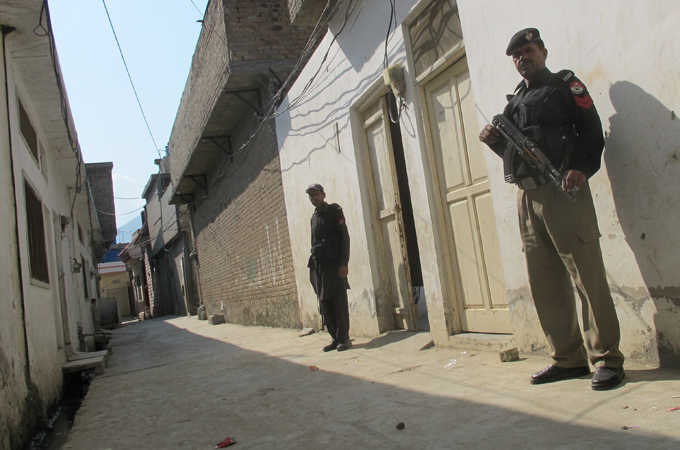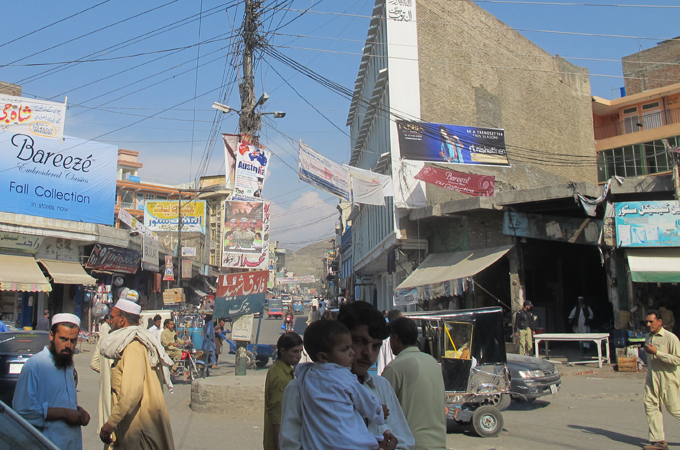Swat Valley on edge after Malala shooting
Police not providing answers and locals scared after Taliban shoot Pakistani activist who fought to educate girls.
![The inside of the van where Malala Yousafzai, Kainat Riaz and Shazia Ramazan were shot [Asad Hashim/Al Jazeera]](/wp-content/uploads/2012/10/20121014163635327580_20.jpeg?resize=570%2C380&quality=80)
Mingora, Swat – The case of Malala Yousafzai, the 14-year-old Pakistani student activist who is struggling for life after Taliban gunmen attacked her on Tuesday, has captured the world’s attention.
Reports on her condition are being constantly circulated through the news and social media, while prayer and solidarity events have been held across the globe.
She was not, however, the only girl shot in that school van in the Swat Valley on Tuesday morning.
Tucked away in a small house in the Makan Bagh area of Mingora, Swat’s main town, lies Kainat Riaz, quietly recovering from the bullet wounds she suffered that day after a gunman opened fire inside the cramped confines of their school van.
“We were coming home from school, where we had an exam. It was our Urdu exam, so at that time I was discussing the paper with my friend. We were talking about how one of the fill-in-the-blanks was supposed to have one answer, but I put in another, when a young man stuck his head into the back of the van. He had a pistol in his hand,” she told Al Jazeera, of the morning of the attack.
“We were all terrified. I felt like I was watching a dream. We were screaming, and he told us to stop. When we stopped, he asked about Malala, asking who she was. When a classmate responded, he started firing. In the firing, Malala was hit and they then ran away. […]I don’t remember anything after that. I was in my teacher’s lap [and fell unconscious].”
Riaz was hit in her upper right arm; the bullet passing clean through without striking bone. Shazia Ramazan, another classmate, was less fortunate: her wounds required her to be evacuated to the Combined Military Hospital in Peshawar, from where she was expected to be discharged on Sunday, family members told Al Jazeera.
Family’s ordeal
While Riaz’s wounds were not as severe as Malala’s, her family’s ordeal began after she had returned home and they realised that she would need immediate treatment for the bullet wound.
While Malala, who was the target of the attack and a national peace icon, was ably taken care of by doctors at the local Saidu Sharif government hospital, Riaz Ahmed, Kainat’s father, told Al Jazeera his daughter did not see the same level of attention.
“We received no support at the hospital. We had to buy all of the medicines ourselves. So much so that we even had to buy the thread for her stitches,” he said. “Even the syringe,” Kainat said.
All of this is at odds with the federal government’s statements on Riaz and Ramazan’s treatment. Asif Ali Zardari, the Pakistani president, said on Saturday that they were to be provided free medical care.
Raja Pervez Ashraf, the Pakistani prime minister, has echoed that sentiment, and the military, who is managing Malala’s care, said in a statement that the two girls were “also being taken care of at places where they can get best treatment”.
“No one from the federal government has been in contact with us [about any of this],” said Ahmed, Kainat’s father, though he did point out that several local political leaders had visited and helped with sums of money in their individual capacities.
Al Jazeera asked Kainat if she felt her attackers would face justice.
“I don’t know,” she said, simply.
Clouded in mystery
We put the same question to local police officials and, somewhat surprisingly, received little more guidance than Kainat had offered on the matter.
The investigation into the shooting has become shrouded in mystery, with police officials at each of the local police stations, including the one where the case was first filed, unable to furnish specifics regarding arrests or suspects.
 |
| Security outside the home of Kainat Riaz, another school girl shot by the Taliban [Asad Hashim/Al Jazeera] |
Speaking on condition of anonymity, a police officer who was working on the case told Al Jazeera that a special investigation team had been formed, with representatives from each of the local police stations, the public prosecutor’s office and the country’s intelligence services all represented.
He said that dozens of suspects had been rounded up and questioned, and that police were going through mobile phone data and witness testimony in order to narrow down their range of suspects.
Other police officials, however, confirmed that none of the at least 60 suspects who had been questioned by police in Swat had been held after their interrogations.
Others have been held elsewhere, however.
None of the investigators spoke on the record, citing concerns regarding the military’s orders on information regarding the high profile case.
“I think we are headed in the right direction,” said a police officer familiar with the case.
“It is a matter of days, we hope, before we are able to track down the suspects.”
“Swat’s people are helping us. They talk to us willingly – they want the local Taliban to be rooted out.”
A habit of fear
While that may well be true, there is a surreal sense, when walking through the streets of Mingora, of seeing not a city in the present, but one upon which there still hangs the pallor of the two years, from 2007 to 2009, when the Taliban held sway here.
Residents will often refer to landmarks and buildings, for example, by citing how they were the site of a suicide attack, or how such-and-so government official had been killed there.
Al Jazeera spoke to residents and tradesmen near Khooni [Blood] Chowk, a well-known intersection, where the Taliban used to string up the dead bodies of men they had executed for defying their edicts.
They continually cited how much better life had become since an army operation had driven the Taliban out into the surrounding areas, and how they were no longer as fearful.
 |
| At Khooni Chowk [Blood Intersection], the Taliban have tied up the dismembered remains of men they killed for defying their edicts [Asad Hashim/Al Jazeera] |
“People in Mingora do not feel like they have been attacked as a people and that the time will come again where fear will sit in their hearts,” said Muhammad Raheem, 37, a shoe-seller at the chowk, who said he frequently witnessed dismembered dead bodies being tied up from a light pole as he came in to work in the years under the Taliban.
“Mingora’s people are taking this in their stride.
“We condemn the attack, and this was a very bad incident. It should not have happened.”
Rehmat Ali, 36, who runs a cellphone store, said: “People will be scared, but as I see it, that fear is almost gone [compared to before].
“People send their kids to school, with prayers – but as far as the fear is concerned, it is almost gone.”
Fazal Wahab, 42, a local store-owner, echoed that sentiment. “The resistance will grow even more than before after this attack,” he told Al Jazeera.
“After the crisis with the Taliban, I have seen that the desire to educate one’s daughters has increased, not decreased.”
Police officials, however, tell a different story, about fear. They told Al Jazeera that while most people were entirely against the Taliban, they also feared for what would happen to them if they were seen to be co-operating with the authorities against them.
It’s a well-founded fear, given the Taliban’s record of targeted killings.
And on Saturday, the Taliban widened their net of potential targets in Swat, saying that they would now specifically target international news media, because their coverage of the shooting was discrediting the extremist force.
And what of Kainat Riaz’s fear?
She told Al Jazeera she did not sleep for two days after the attack, out of sheer terror. She even delayed going to the hospital, because she feared that the Taliban may launch a second attack on Malala Yousafzai after the first was unsuccessful.
“[But] I will go back to school as soon as the doctors say I can,” she said, confidently. “Ever since I was small my mother told me that I will do a job. And I want to be a doctor.”
Follow Asad Hashim on Twitter: @AsadHashim